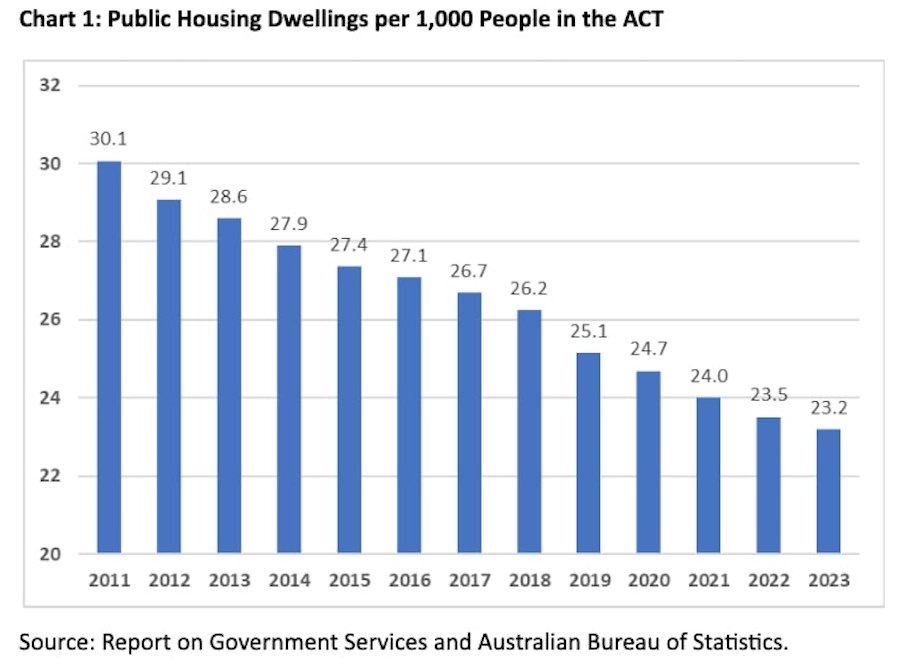
“Housing ministers Yvette Berry and Rebecca Vassarotti have engineered a housing policy that any dedicated right-wing neoliberal would be proud to claim.” JON STANHOPE & KHALID AHMED unbutton the government’s housing shame.
On Page 21 of the 2024-25 Budget Paper 3, Treasurer Andrew Barr advises Canberrans that:
“Housing and rental affordability in the ACT remains relatively better than other jurisdictions predominantly as a result of higher household incomes.”
In a statistical flourish, or simply out of ignorance of the drivers of demand, a preceding chart seeks to demonstrate that the ACT government has maintained supply in check with population growth.
A further chart that compares mortgage and rental costs as a proportion of median incomes across Australia is included, it appears, to legitimise the following assertion:
“Maintaining housing supply growth at a higher rate than population growth as shown above and supporting conveyance duty relief for owner occupiers (particularly first home buyers) will continue to improve rental and housing affordability”.
In other words, if you are one of the tens of thousands of Canberrans living on a median income, then stop whingeing because you are better off than people on median incomes in other states.
This brazen assertion is cold comfort to those families struggling to survive on below-median incomes with crippling mortgage costs resulting, in the main, from the exorbitant price demanded by the ACT government for land or those who have been priced out of home ownership and are paying half their weekly earnings on rent.
One can only wonder what people who are sleeping rough or who cannot find a place to rent or have been waiting years for public housing think about this advice?
The “conveyance duty relief” boasted about in the second quoted paragraph, and in which the Labor/Green Government declares victory over the affordability “problem”, relates to off-the-plan units and RZ1 unit duty exemptions for properties up to $1 million, and the extension of the Disability Duty Concession Scheme and the Pensioner Duty Concession Scheme to provide a concession on duty on purchases up to a $1 million.
The obvious and immediate questions this raises are how many pensioners and disabled people the government expects to benefit from the stamp duty concession on million-dollar homes and, in general, how commonplace is the purchase of million-dollar, off-the-plan apartments. The fact that the government has felt compelled to provide stamp duty concessions for million-dollar apartments is a clear admission that its taxation reform (that was meant to eliminate stamp duty) and its affordability policy, have failed.
The ACT has two ministers – one Labor, the other Green – overseeing the housing portfolio: Labor’s Yvette Berry is identified on the Legislative Assembly website as Minister for Housing and Suburban Development, and Rebecca Vassarotti as Minister for Homelessness and Housing Services.
The repeated denial by both ministers of a housing affordability problem suggests they are either residing in a bubble, or blind to the plight of Canberrans under mortgage and rental stress, or simply in denial about their failure to meet the basic housing needs of working-class families.
Whatever the explanation they have engineered a housing policy that any dedicated right-wing neoliberal would be proud to claim.
Obviously, the housing needs of a majority of Canberrans can be met by the housing market. However, because of its nature, the market nevertheless fails to meet the needs of many others.
The outcomes range from financial stress to homelessness that, in turn, lead to poor physical and mental health, and ultimately withdrawal from social relationships and economic participation. The number of people whose needs are not met by the market is not insignificant, and invariably increases in periods when the market is delivering large gains for those with the means to participate in it.
Therefore, when investors, homeowners and the real estate industry rejoice at an increase in the “strength of the housing market” and the value of their portfolios, equity and homes, one would expect that a “progressive” government would respond immediately to the adequacy of its stock of public and community housing.
The other key plank of housing policy is to ensure that the market, as far as possible, operates efficiently; that constraints and bottlenecks on supply are removed and that there is effective regulation. Notably, the ACT government is the only one in Australia that has complete control over the supply of the most important ingredient of a successful housing policy – land.
So, how has the ACT government performed when it comes to maintaining a consistent supply of public housing?
Chart 1 provides the proportion of public housing relative to the population from 2011 to 2023.

It is remarkable that in every year of the three terms of the current Greens-Labor coalition government, the stock of public housing in Canberra, relative to the population, has dropped.
If the housing stock provision had simply been maintained at the 2011 level, there would today be an additional 3200 public housing dwellings in Canberra.
What is even more remarkable is that the decrease in public housing is, in the main, a consequence of active and deliberate decisions by the ACT government.
The most notable of those is the sale of 1288 public housing dwellings with the proceeds directed to the Light Rail project, formalised under an agreement signed by Treasurer Andrew Barr and the then Federal Treasurer, Josh Frydenberg.
This program was euphemistically titled the Public Housing Renewal Program. It included a much-touted commitment to invest $700 million in public housing which, surprise-surprise, never eventuated. In fact there was a net loss of 194 public housing dwellings during a period when dwelling prices were increasing at a rate of $1000 a day, putting the housing market out of reach of a major cohort of Canberra households.
The second renewal program, titled Growing and Renewing Public Housing, also announced with great fanfare, promised the delivery of 400 dwellings. It, too, needed to be abandoned as it sought to involuntarily evict more than 300 tenants, mainly elderly widowed women, the disabled and people with mental health conditions – people who should, one would have thought, been protected by a “progressive” government through such programs.
The Statement of Risks in the 2024-25 Budget Paper 3 (Appendix I, Page 347) refers to the following fiscal risk in relation to this program:
“The fiscal risk arises from the class action launched in December 2023 against the Australian Capital Territory and Housing ACT in implementing the Growing and Renewing Public Housing Program. Fiscal implications will arise should the outcome of the class action be favourable to applicants who are seeking financial compensation.”
It is extraordinary that some of the most vulnerable people in our community were forced to resort to legal action to protect themselves against, what they consider, a breach of their human rights.
We have previously drawn parallels between this program and the Robodebt scheme as examples of executive overreach without regard to ethics or the community’s sense of common decency.
While this poorly designed and poorly executed program remains, thankfully, on hold, the government appears to have given up on the idea of any significant increase in public housing. The 2024-25 Budget includes $50 million in capital, of which $5 million comes from the Commonwealth – that is, a paltry 50 dwellings by the government’s own measure.
We have previously written about the appalling deterioration in stock condition with one in 12 housing tenants seeing their homes becoming unacceptable since 2016. Aboriginal tenants and those with a disability fared much worse with about one in five and one in six households, respectively, seeing their dwelling deteriorate below an acceptable level.
The Budget provides a paltry and clearly inadequate $51.2 million over four years for repairs and maintenance.
A “progressive government”? Two “progressive ministers”? You decide.
We will address the other major housing policy plank – land supply – in a subsequent article. We do note, however, that the Indicative Land Release Program sets a target of 5107 dwelling sites to be released in 2024-25. Notably this government has never achieved anywhere near such a target, averaging just 3568 dwelling sites a year since 2011-12.
Jon Stanhope is a former chief minister of the ACT and Dr Khalid Ahmed a former senior ACT Treasury official.
Who can be trusted?
In a world of spin and confusion, there’s never been a more important time to support independent journalism in Canberra.
If you trust our work online and want to enforce the power of independent voices, I invite you to make a small contribution.
Every dollar of support is invested back into our journalism to help keep citynews.com.au strong and free.
Thank you,
Ian Meikle, editor








Leave a Reply